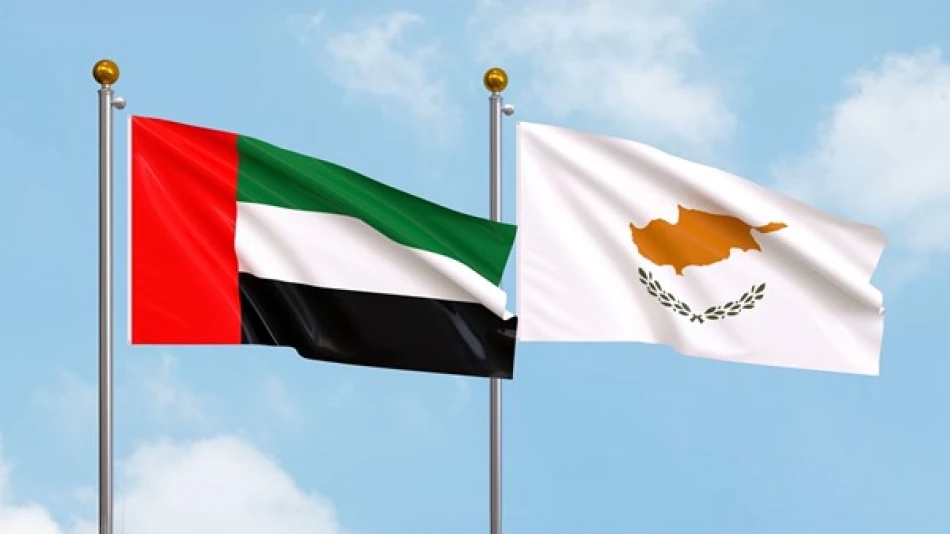
UAE and Cyprus Issue Joint Statement on Delivering Humanitarian Aid to Gaza via Maritime Corridor
UAE and Cyprus Expand Gaza Aid Operations Through Strategic Maritime Corridor
The United Arab Emirates and Cyprus have significantly scaled up their joint humanitarian initiative for Gaza, delivering 1,200 tons of critical aid through the Amalthea maritime corridor. This expansion represents one of the most substantial coordinated relief efforts since the corridor's launch in March 2024, demonstrating how regional partnerships can circumvent traditional aid delivery challenges in conflict zones.
The Amalthea Corridor: A Strategic Humanitarian Gateway
The Cyprus-to-Gaza maritime route has emerged as a crucial alternative to land-based aid delivery, which has faced significant logistical and security obstacles. Operating under UN Security Council Resolution 2720, the corridor provides a mechanism for monitoring and verifying aid flows while maintaining operational independence from traditional diplomatic channels.
The current shipment, processed through Israel's Ashdod port before reaching Gaza, includes essential food supplies with particular emphasis on children's nutrition and wheat flour. This focus reflects the acute food security crisis that has gripped the territory, where international organizations report widespread malnutrition among vulnerable populations.
International Coordination and Operational Framework
Multi-Agency Collaboration
The operation showcases effective coordination between the UN Office for Project Services (UNOPS) and World Central Kitchen (WCK), two organizations with complementary capabilities in logistics and emergency food distribution. This partnership model has proven effective in other crisis zones, including Ukraine and Haiti, where rapid deployment and local knowledge are essential.
Funding and Resource Mobilization
The UAE's establishment of the Amalthea Fund represents a significant commitment to sustained humanitarian operations rather than one-time aid drops. This approach mirrors successful models used by Gulf states in previous regional crises, where dedicated funding mechanisms ensure operational continuity beyond initial emergency phases.
Regional Implications and Diplomatic Significance
The UAE-Cyprus partnership reflects broader shifts in Middle Eastern diplomacy, where humanitarian cooperation can proceed independently of political negotiations. Cyprus's geographic position and EU membership provide crucial legitimacy and operational access, while the UAE brings substantial financial resources and regional diplomatic weight.
This collaboration also demonstrates how middle powers can create effective humanitarian channels when larger international mechanisms face political gridlock. Similar partnerships have emerged in other conflict zones, including the UAE's role in Afghanistan aid operations and Cyprus's previous involvement in Syria relief efforts.
Operational Challenges and Future Sustainability
Despite its success, the maritime corridor faces inherent limitations compared to land-based supply chains. Sea transport requires favorable weather conditions, port infrastructure maintenance, and complex security coordination. The 1,200-ton shipment, while substantial, represents only a fraction of Gaza's estimated daily humanitarian needs.
The initiative's long-term viability depends on continued international support and the ability to scale operations significantly. Both countries have committed to expanding the corridor's capacity, but this will require additional vessels, enhanced port facilities, and broader international participation.
Market and Economic Considerations
The humanitarian corridor creates interesting precedents for crisis-zone logistics and supply chain management. Private sector involvement, particularly in shipping and logistics, could provide models for future emergency response operations. The UAE's investment in humanitarian infrastructure also aligns with its broader strategy of positioning itself as a regional hub for international aid operations.
For Cyprus, the initiative enhances its role as a strategic gateway between Europe and the Middle East, potentially attracting additional international organizations and aid agencies to establish regional operations on the island.
Most Viewed News

 Layla Al Mansoori
Layla Al Mansoori






